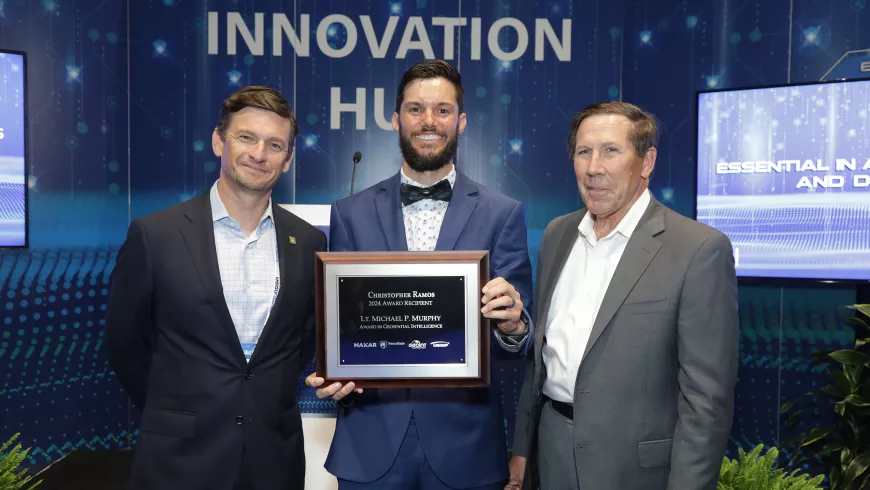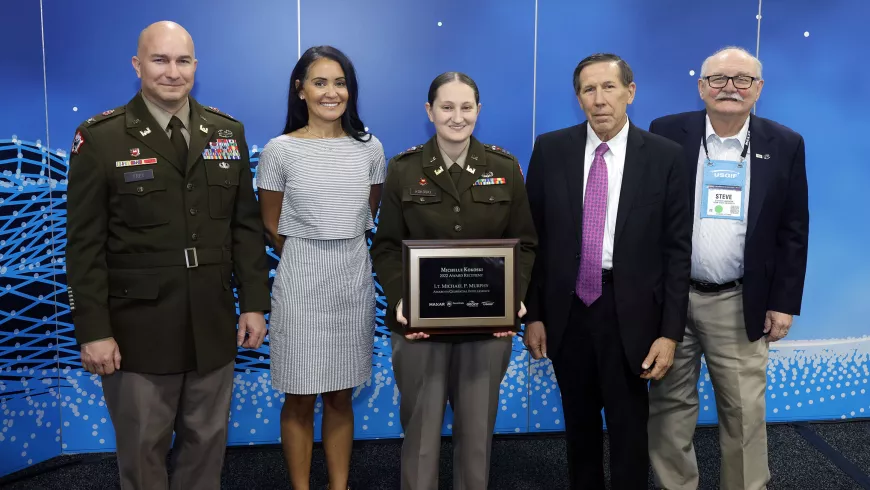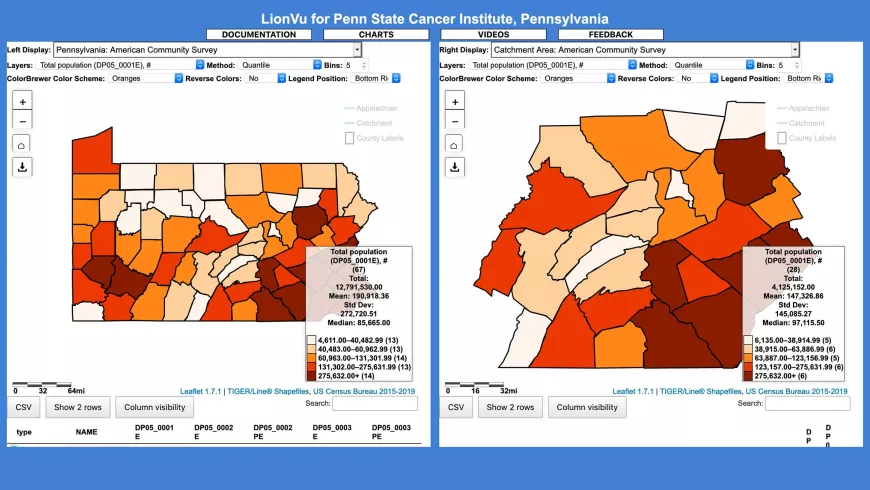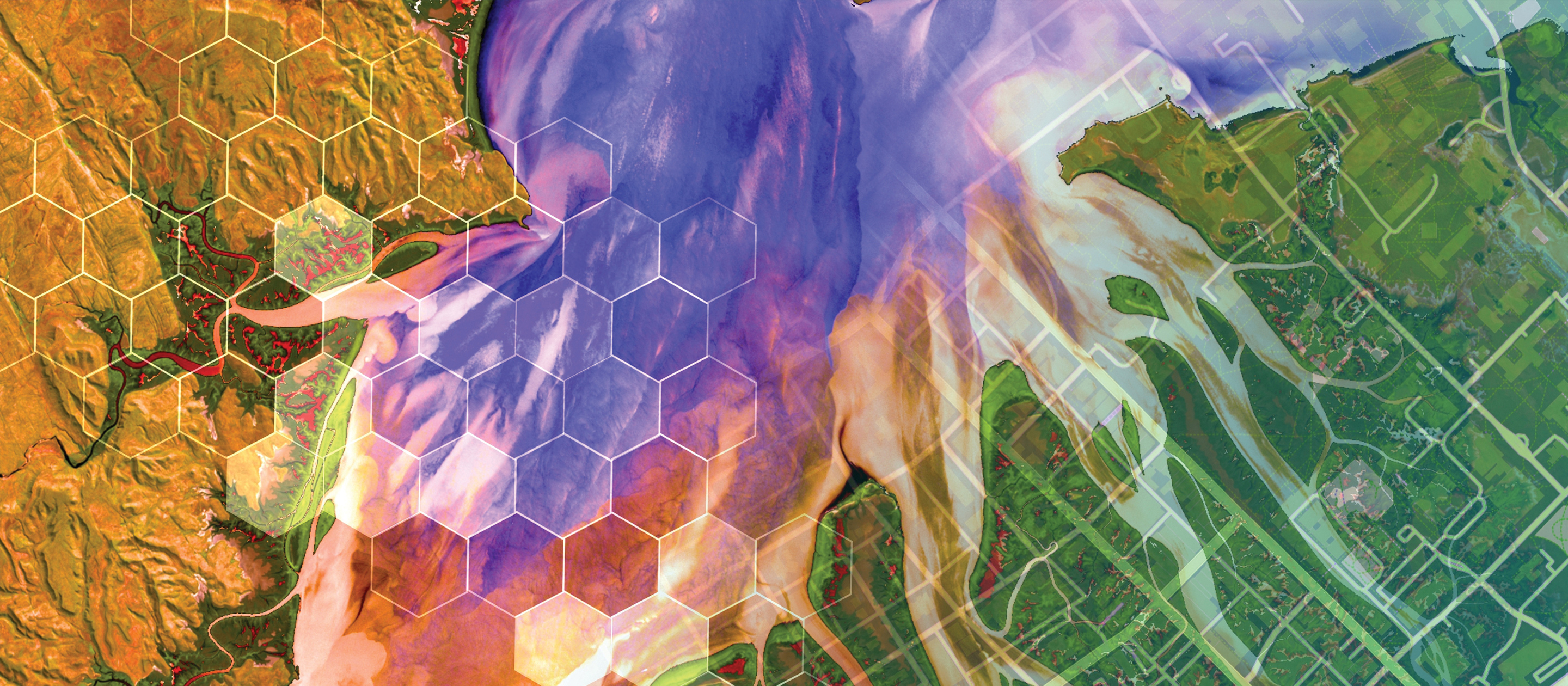100% Online
Complete your Penn State course work at your own pace and 100% online.
Application deadline
Credits and costs
10-Week Terms
Finish your program faster with accelerated 10-week terms.
Acquire Advanced GIS Skills to Inform Better Decision-Making
Use GIS to facilitate data analysis to solve location-based challenges that impact our world.
Design and maintain database systems using GIS technology and software.
Understand the scope, impact, and trajectory of the geospatial revolution.
Identify and resolve common ethical issues in the geographic information science and technology fields.
Leverage GIS in domains such as conservation, environmental resource management, urban planning, business, public health, and more.
Online GIS Certificate Courses
Online GIS Certificate Courses
Customize your learning by choosing from in-demand electives like open web mapping, real-world application of GIS, advanced Python programming, spatial data science, emerging trends in remote sensing, location intelligence for business, and more.
The 12-credit GIS certificate program's courses compose the first year of Penn State's Master of Geographic Information Systems online degree program. Students who successfully complete the certificate may apply to the online master's degree program and, upon acceptance, immediately begin the second year of study. Alternatively, students who complete at least 3 certificate courses may pursue accelerated admissions to any Penn State geospatial-related graduate degree program available through World Campus.
Required Courses (9 credits)
Novice Track: For students with little to no experience in GIS, required courses for the certificate are GEOG 482, GEOG 483, and GEOG 484.
Experienced Professionals Track: With approval from the program and instructor, experienced professionals can complete additional electives instead of GEOG 483 and GEOG 484 if they already possess the required skills.
- 3credits
Case studies, student investigations, and projects reveal the scope, impact, and character of the Geospatial Revolution.
- 3credits
How geographic information systems facilitate data analysis and communication to address common geographic problems.
- Experienced Professionals Track
With program and instructor approval, students who already have experience in this area may substitute an elective for this required course. To determine if you possess this skill set, visit the GEOG 483 sample syllabus.
- 3credits
Database design, creation, maintenance, and data integration using desktop GIS software.
- Experienced Professionals Track
With program and instructor approval, students who already have experience in this area may substitute an elective for this required course. To determine if you possess this skill set, visit the GEOG 484 final sample syllabus.
Elective Courses (at least 3 credits)
Students must complete 12 total credits to earn the certificate. You will need 3 credits of electives if you complete all required courses. If you follow the track for experienced professionals, select 3–9 credits of electives based on the number of required courses you opt out of.
Prerequisites as listed may be waived by the course instructor if you can demonstrate the required level of competency.
- 3credits
Examines the nexus of geospatial intelligence analysis with cyberspace, the geopolitics of cyber threats, the politics of censorship and hacking, public safety, disaster response, and humanitarian relief; students will utilize a range of cyber data, systems, and spatial sciences to examine human social networks of the internet.
- Prerequisite
GEOG 160 or GEOG 482 or permission of program
- 3credits
Using imagery and terrain data in typical application scenarios faced by the geospatial professional.
- 3credits
Understanding lidar systems; design, operation, data processing techniques, and product generation to address typical application scenarios faced by the geospatial professional.
- 3credits
Customizing GIS software to extend its built-in functionality and to automate repetitive tasks.
- Prerequisite
GEOG 484 or equivalent experience
- 3credits
Theory and practice of cartographic design, emphasizing effective visual thinking and visual communication with geographic information systems. Technologies: ArcGIS Pro, Mapbox Studio, QGIS
- Prerequisite
GEOG 484 or permission of the program
- 3credits
Real-world applications of GIS and spatial analysis to investigate a variety of current environmental issues.
- 3credits
Learn advanced applications of Python for developing and customizing GIS software, designing user interfaces, and solving complex geoprocessing tasks using both proprietary and open source platforms. Technologies: ArcGIS Pro, ArcPy, Jupyter Notebooks, ArcGIS API for Python, QGIS, GDAL/OGR.
- Prerequisite
GEOG 485 or permission of the program
- 3credits
The application of cultural geography in the intelligence analysis and synthesis process by identifying prominent threats to civil security.
- 3credits
Traces the roots of spatial data science ethics in moral philosophy, professional ethics frameworks, and critical studies. Students will critique legal and policy issues in the U.S. and abroad.
- 3credits
Design, development, and implementation of web mapping applications using OGC standards and open source software.
- 3credits
Focuses on theoretical discussions on relevant topics and methods used in spatial data science, as well as on applying a range of spatial data science skills and tools to solve real-world problems and model geographic phenomena.
- 3credits
Advanced topics in remote sensing and image processing, including new sensors, applications, and decision-making.
- 3credits
The role of geographic information systems in understanding disease, including relevant spatial analysis and cartographic visualization techniques.
- Prerequisite
GEOG 482, GEOG 483, and GEOG 484, or permission of the program
- 3credits
Understanding location technology and geospatial analysis to support an efficient and effective pathway to better business decisions.
- 3credits
Requirements analysis and proposal writing to plan and implement GIS solutions supporting emergency management activities of government agencies and contractors.
- Recommended Preparation
GEOG 483
- 3credits
Explores three important topics related to georeferenced data: datums, map projections, and grid systems.
- Prerequisite
GEOG 483 or permission of the program
- 3credits
Focuses on how geospatial professionals can create applications using industry-related geospatial APIs. Students will build applications using the core web technologies of HTML, CSS, and JavaScript. Technologies: JavaScript, ArcGIS API for JavaScript, ArcGIS Online, CSS
- 3credits
Theory and practical applications of using cloud computing and server resources to solve geospatial problems. Technologies: ArcGIS Server, Portal for ArcGIS, ArcGIS Online, GeoServer, CARTO, Amazon Web Services, Mapbox, Google Fusion Tables Theory.
- Prerequisite
GEOG 484 or permission of the program
- 3credits
Advanced topics in the storage, management, and retrieval of geospatial data using common proprietary and open-source relational database technologies. Technologies: SQL, PostGIS, ArcSDE/Multiuser Geodatabases, QGISAdvanced.
- 3credits
Understanding remote sensing systems' operation, data products, and processing techniques to address typical problem scenarios faced by the GEOINT professional.
- 3credits
Common platforms, analytical strategies, and policy dimensions of Unmanned Aerial Systems (UAS) in public, private, defense, and humanitarian applications.
- 3credits
Addresses cutting-edge geospatial intelligence topics that impact the global academic and professional community.
Course Availability
If you're ready to see when your courses will be offered, visit our public LionPATH course search (opens in new window) to start planning ahead.
Start or Advance Your Career
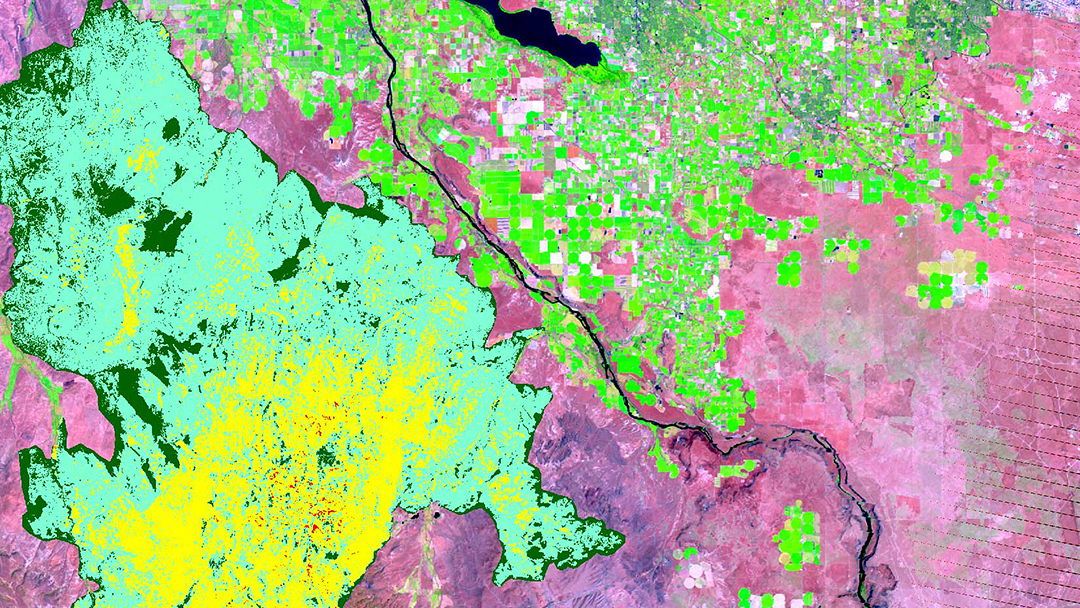
Start or Advance Your Career
You can use the knowledge gained from this program and the support of Penn State career resources to pursue careers in a variety of fields, depending on your goals.
Job Titles Related to This Degree
Our students and alumni are working professionals in more than 150 geospatial organizations around the world in every major sector of the mapping, GIS, and GEOINT industries.
Penn State's online certificate in GIS can help you start or advance your career in:
- urban and regional planning: architects, engineers, scientific researchers, managers, technical consultants, local government officials, GIS analysts
- resource management: environmental scientists and specialists, transportation and logistics managers, operations specialists, and health specialists
- surveying and cartography: surveyors, cartographers, photogrammetrists, and mapping technicians
Career Services to Set You Up for Success

From the day you're accepted as a student, you can access resources and tools provided by Penn State World Campus Career Services to further your career. These resources are beneficial whether you're searching for a job or advancing in an established career.
- Opportunities to connect with employers
- Career counselor/coach support
- Occupation and salary information
- Internships
- Graduate school resources
Ready to Learn More?
Get the resources you need to make informed decisions about your education. Request information on this program and other programs of interest by completing this form.
Ready to take the next step toward your Penn State graduate certificate?
Costs and Financial Aid
Costs and Financial Aid
Learn about this program's tuition, fees, scholarship opportunities, grants, payment options, and military benefits.
Costs and Financial Aid
Graduate Tuition
Graduate tuition is calculated based on the number of credits for which you register. Tuition is due shortly after each semester begins and rates are assessed every semester of enrollment.
2025–26 Academic Year Rates
| How many credits do you plan to take per semester? | Cost |
|---|---|
| 11 or fewer | $1,037 per credit |
| 12 or more | $12,448 per semester |
Paying for Your Certificate
Students pursuing this certificate may be eligible for federal student aid. Find more information from the online geospatial education program office.
Additionally, Penn State offers many ways to pay for your education, including an installment plan and third-party payments. Penn State World Campus also offers an Employer Reimbursement and Tuition Deferment Plan. Learn more about the options for paying for your education.
Students pursuing a degree and meeting all other eligibility requirements may qualify for financial aid.
Military Benefits
Military service members, veterans, and their spouses or dependents should explore these potential military education benefits and financial aid opportunities, as well.
Additional Cost of Attendance Details
To view the detailed list of cost of attendance elements:
- visit the Tuition Information site
- click the plus sign to expand the table
- select a semester from the World Campus row
Technical Requirements
Review the technical requirements for this program.
A Head Start toward a Master’s Degree

A Head Start toward a Master’s Degree
Not only can this program help create opportunities in your career, it can also give you a solid head start toward a full master’s degree.
Degree Programs Related to This Certificate
Some or all credits earned for this certificate may be applied to one of the following Penn State World Campus degree programs, should you apply and be accepted into the program:
This online GIS master’s degree program can help you uncover insights and relationships to improve strategic decision making. Learn to apply industry best practices and the latest mapping tools to integrate, visualize, and interpret geospatial data. Customize your GIS degree program with 30 online courses.
Learn more about the Master of Geographic Information SystemsCombine intelligence analysis with geospatial science and technology to gain situational awareness and provide a decisive advantage in preventing and responding to homeland security threats. This online degree program can help improve the accuracy of your organization's most critical intelligence assessments.
Learn more about the Master of Professional Studies in Homeland Security – Intelligence and Geospatial Analysis OptionThe M.S. in Spatial Data Science can help you leverage vast amounts of geospatial data to identify patterns, develop insights, and solve location-based problems. Prepare to work where GIS and spatial analysis intersect with the principles of data science, visualization, and programming.
Learn more about the Master of Science in Spatial Data ScienceAccelerated Admission to an Online Master's Program
Accelerated Admission to an Online Master's Program
Any geospatial certificate student who earns a 3.67 grade-point average or higher after completing the first three courses of the certificate may qualify for accelerated admission to the Master of Geographic Information Systems, Master of Science in Spatial Data Science, or Master of Professional Studies in Homeland Security – Intelligence and Geospatial Analysis Option.
Advantages of accelerated admissions:
- no GRE test, professional experience, or letters of recommendation required
- admission decisions made on a rolling basis, year-round
Take Advantage of Flexible Course Scheduling
Take Advantage of Flexible Course Scheduling
The GIS certificate program operates on five 10-week terms. With two terms that partially overlap in fall and spring, and one term in the summer, you are provided with the greatest flexibility possible in completing your degree at your preferred pace.
You can choose to schedule your courses without any overlap or take as many courses as possible to finish sooner.
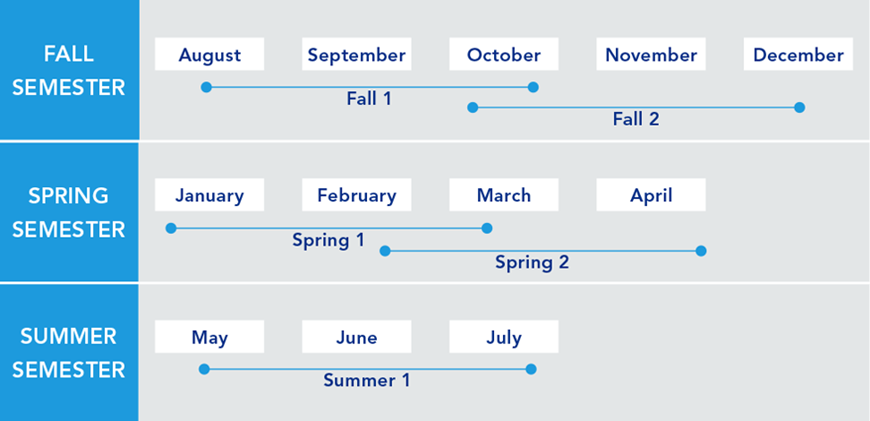
Earn Your Certificate in Less Than a Year
Whether you are looking to finish your program as quickly as possible or balance your studies with your busy life, Penn State World Campus can help you achieve your education goals. Many students take one or two courses per semester.
Convenient Online Format
This program's convenient online format gives you the flexibility you need to study around your busy schedule. You can skip the lengthy commute without sacrificing the quality of your education and prepare yourself for more rewarding career opportunities without leaving your home.
A Trusted Leader in Online Education

Penn State has a history of more than 100 years of distance education, and World Campus has been a leader in online learning for more than two decades. Our online learning environment offers the same quality education that our students experience on campus.
Information for Military and Veterans

Are you a member of the military, a veteran, or a military spouse? Please visit our military website for additional information regarding financial aid, transfer credits, and application instructions.
How to Apply to Penn State

How to Apply to Penn State
Apply by August 1 to start August 13
Application Instructions
Deadlines and Important Dates
Complete your application and submit all required materials by the appropriate deadline. Your deadline will depend on the semester you plan to start your courses.
Fall Deadline
Apply by August 1 to start August 13Spring Deadline
Apply by December 15 to start January 7Summer Deadline
Apply by April 15, 2026, to start May 20, 2026
Steps to Apply
For admission to the J. Jeffrey and Ann Marie Fox Graduate School, an applicant must hold either (1) a baccalaureate degree from a regionally accredited U.S. institution or (2) a tertiary (postsecondary) degree that is deemed comparable to a four-year bachelor's degree from a regionally accredited U.S. institution. This degree must be from an officially recognized degree-granting institution in the country in which it operates.
You will need to upload the following items as part of your application:
Official transcripts from each institution attended, regardless of the number of credits or semesters completed. Transcripts not in English must be accompanied by a certified translation. If you are a Penn State alum, you do not need to request transcripts for credits earned at Penn State but must list Penn State as part of your academic history.
English Proficiency — The language of instruction at Penn State is English. With some exceptions, international applicants must take and submit scores for the Test of English as a Foreign Language (TOEFL) or International English Language Testing System (IELTS). Minimum test scores and exceptions are found in the English Proficiency section on the Fox Graduate School's "Requirements for Graduate Admission" page. Visit the TOEFL website for testing information. Penn State's institutional code is 2660.
GRE test scores are NOT required.
To begin the online application, you will need a Penn State account.
Create a New Penn State Account
If you have any problems during this process, contact an admissions counselor at [email protected].
Please note: Former Penn State students may not need to complete the admissions application or create a new Penn State account. Please visit our Returning Students page for instructions.
You can begin your online application at any time. Your progress within the online application system will be saved as you go, allowing you to return at any point as you gather additional information and required materials.
- Choose Enrollment Type: "Certificate Admission"
- Choose "WORLD CAMPUS" as the campus
Checking Your Status
You can check the status of your application by using the same login information established for the online application form.5. Complete the application.
Admissions Help
If you have questions about the admissions process, contact an admissions counselor at [email protected].
Contact Us

Contact Us
Have questions or want more information? We're happy to talk.
Our program specialists are available now to help you with your application and to answer any questions you have about our online geospatial programs. Please contact us with anything you wish to discuss.
Julene Santiago
Geospatial Portfolio Program Assistant
Penn State College of Earth and Mineral Sciences
[email protected]
Phone: 814-865-2557
To see more detailed information about the geospatial portfolio, visit the program website within Penn State's College of Earth and Mineral Sciences. You can also visit Penn State’s Repository of Open and Affordable Materials (ROAM) to preview some of the geospatial courses offered online by the Department of Geography.
For general questions about Penn State World Campus, please contact:
World Campus Admissions Counselors
Phone: 814-863-5386
[email protected]
Learn from the Best
Learn from the Best
Penn State World Campus has partnered with the Penn State College of Earth and Mineral Sciences’ renowned Department of Geography to offer a fully online GIS certificate that can accommodate the diverse needs and busy schedules of adult learners.
Faculty
Anthony C. Robinson, Ph.D.
- DegreePh.D., Geography, Penn State
- DegreeM.S., Geography, Penn State
- DegreeB.S., Applied Geography, East Carolina University
Dr. Anthony C. Robinson, professor of geography, serves as the director of online geospatial education at Penn State. He is also the faculty director for the GeoGraphics Lab in the Department of Geography and former president of the North American Cartographic Information Society (NACIS). Dr. Robinson is a cartographer who designs and evaluates geovisualization tools to improve geographic information utility and usability. He has worked in epidemiology, crisis management, national security, and education domains to develop and evaluate new methods for visualizing spatial data.
Ryan Baxter
- DegreeM.S., Geography, Penn State
- DegreeB.A., Geography and Environmental Sciences, Northwestern University
Ryan Baxter advises students and teaches courses in topics including renewable energy, environmental applications of GIS, cloud and server GIS technologies, and introductory geographic information concepts. He is active in technical research projects involving spatial databases, online data discovery tools, interactive mapping applications, and cloud-based GIS services. He is also engaged in research investigating the spatial modeling of land use change, quantifying the amount of land available for bioenergy feedstocks, and assessing the suitability and productivity of energy crops.
Amy Burnicki
DegreePh.D., Natural Resources & Environment, University of MichiganDr. Amy Burnicki is an associate teaching professor in the Department of Geography. Her research applies spatial data analysis, spatial statistics, and quantitative modeling approaches in the field of land change science and in transportation and environmental engineering applications.
James Detwiler
- DegreeM.S., Geography, University of Delaware
- DegreeB.S., Earth Science, Penn State
James Detwiler is in a 100% teaching appointment and specializes in GIS programming. He teaches GEOG 485: GIS Programming and Automation; GEOG 863: Web Application Development; and GEOG 868: Spatial Database Management. His research interests are in the areas of applied GIS and climatology.
Brandi Gaertner
DegreePh.D., Forestry and Natural Resources, West Virginia UniversityDr. Brandi Gaertner, assistant teaching professor of spatial data science in the online geospatial education program, joined the Penn State faculty in 2021. Dr. Gaertner is a climate change hydrologist and GIS analyst. Her research focus is on evaluating historical and future impacts of climate change on surface streamflow and climate variables such as precipitation and temperature.
Panagiotis Giannakis
- DegreePh.D., Geosciences, University of Arkansas
- DegreeM.S., Human Resource Management, Athens University of Economics & Business
Panagiotis Giannakis is an Assistant Teaching Professor in the Department of Geography and the Dutton e-Education Institute within the College of Earth & Mineral Sciences. He received his PhD from the University of Arkansas, where he also maintained a key role in the advancement of the Online Geospatial Certificate program. His research interests lie at the intersection of Economic Geography, Strategic Management, and Social Networks. More specifically, Panagiotis’ research focuses on the relationship between organizational and physical and/or social network space.
Adrienne Goldsberry
- DegreeM.A., Geography, University of California - Santa Barbara
- DegreeB.A., Geography, The University of Texas at Austin
Adrienne Goldsberry is an instructor as well as adviser for students in the Postbaccalaureate Certificate in Geographic Information Systems program. Before joining Penn State, she was an online instructor for Michigan State University's Department of Geography, Environment, and Spatial Sciences and managed its online Professional Certificate in GIS. She also worked as an urban planner for jurisdictions in California, Texas, and Michigan.
Fritz Kessler
- DegreePh.D., Geography, University of Kansas
- DegreeM.S., Geography, Penn State
- DegreeB.S., Geography, Ohio University
Dr. Fritz Kessler's teaching interests include cartography, geographic visualization, map projections, spatial analysis, land surveying, geography of health, and statistics. His research interests include map projections, geographic visualization, history of cartography, and cognitive cartography.
Beth King
- DegreeM.Ed., Adult Education, Penn State
- DegreeB.S., Geography, Penn State
Beth King is co-author and instructor of GEOG 483: Problem-Solving with GIS; GEOG 482: Making Maps that Matter with GIS; and GEOG 597G: Challenges in Global Geospatial Analytics. She is assistant program manager for Online Geospatial Education and maintains regular communication with students in the MGIS degree program to identify their questions and concerns. Previously, she worked as a GIS analyst for a private water/wastewater engineering firm, where she managed a wide range of GIS projects, from turnkey sanitary sewer conversion to 911 rural addressing.
Karen Schuckman
- DegreeM.S., Geographic Information Systems, Penn State
- DegreeB.A., Liberal Arts, Penn State
- DegreeB.S., Meteorology, Penn State
Karen Schuckman's teaching and research interests include applications of airborne and spaceborne remote sensing to topographic mapping, land-use/land-cover analysis, positional accuracy assessment of remotely sensed base map data products, and other geospatial applications.
Gregory Thomas
- DegreePh.D., Administration and Leadership Studies, Indiana University of Pennsylvania
- DegreeMPA, Penn State
- DegreeB.S., Criminal Justice, Shippensburg University of Pennsylvania
Dr. Gregory Thomas has experience developing intelligence for decision-makers, supervising the analytical process, and providing team guidance. He also has experience teaching intelligence and analytical techniques to college students as well as intelligence analysts and law enforcement personnel. He has developed operational intelligence to support criminal investigations and anti-terrorism activities, and has selected, trained, and supervised analysts in a criminal intelligence center. His teaching and research focus on geospatial intelligence analysis, homeland security, and criminal intelligence.
Michelle Zeiders
- DegreeM.S., Geoenvironmental Studies, Shippensburg University of Pennsylvania
- DegreeB.S., Public Administration, Shippensburg University of Pennsylvania
Michelle Zeiders teaches GEOG 483: Problem-Solving with GIS; GEOG 484: GIS Database Development; and GEOG 487: Environmental Applications of GIS. She has been teaching introductory and software-intensive GIS courses since 1998. Prior to joining the geospatial education program, she worked as a GIS programmer/instructor for the Penn State Population Research Institute, a GIS project manager/instructor for the Institute for Transportation Research and Education at North Carolina State University, a GIS project manager at a private civil engineering firm, and a GIS analyst at MapQuest.
News

